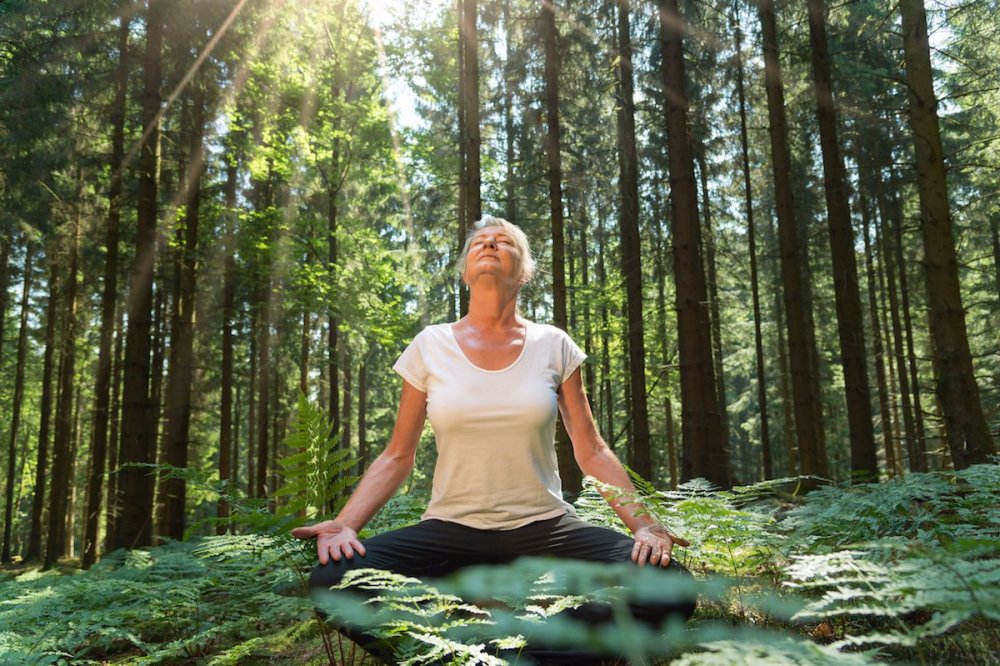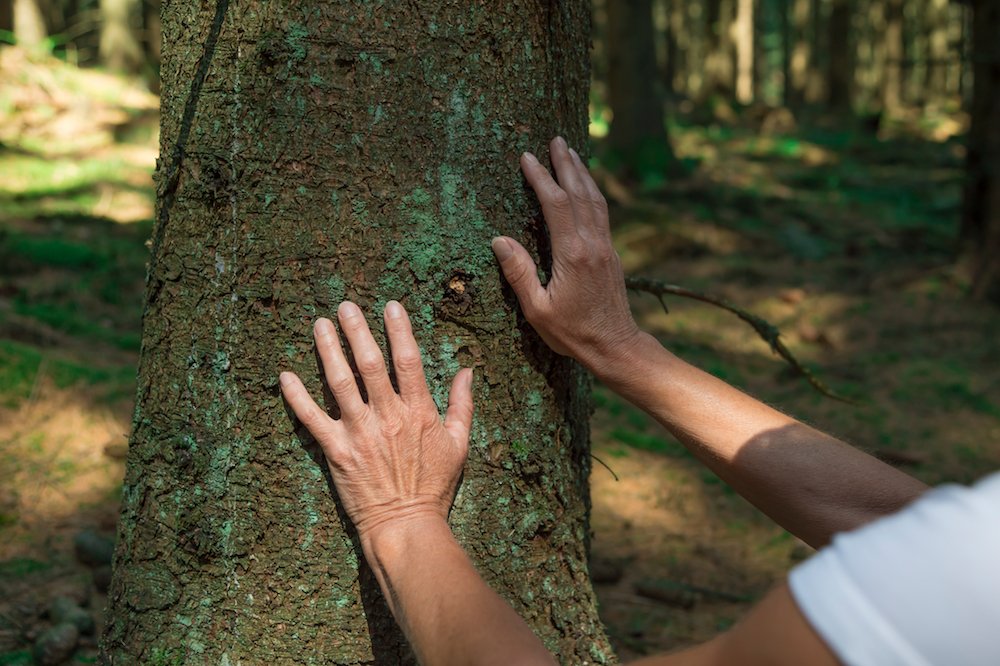Some consider it a form of mindfulness, whereas others look at it as a weekly variation to their fitness regime. Sonia Vadlamani describes how reconnecting with nature through forest bathing can prevent tech-burnout, improve your health and boost creativity.
In a world where we’re increasingly connected online and bombarded with information and noise, many of us feel overwhelmed. Periodically taking time out of our busy schedules and disconnecting from the information overload is always a good idea. This is the core principal behind forest bathing, or Shinrin-yoku, as the Japanese call it.
Despite what the phrase 'forest bathing' suggests, you needn't pack your swimwear – it doesn't equate directly to taking a dip in a woodland lake or rive (although it definitely could include that!).
You see, forest bathing encompasses everything about slowing down and immersing yourself fully in nature and greenery. And, in case you have time constraints and can’t possibly camp in the woods for an entire day, spending time in a forest or lush green area for even two to three hours really can be beneficial. In fact, science says so.

'Bathing' in forests rejuvenates and reinvigorates
Furthermore, you don’t have to be a wilderness expert to take up forest bathing – it’s recommended for anyone who wishes to unwind and feel rejuvenated. Personally, spending time in forests has worked wonders for me, in terms of well-being, mental health, and even career growth. I find that taking some away from the daily grind to relax amidst nature sparks my creativity, thus enabling me to put forward my best work.
So, what exactly is forest bathing?
Most cultures have long understood how spending time amidst nature can benefit one’s well-being and health. The Japanese were quick to embrace this practice, having seen some of the physiological and psychological benefits of forest bathing.
Forest bathing essentially entails ‘bathing’ in the surrounding of a forest, wood, or any other dense green space. And there’s a lot more to it than just a sweaty hike intended to raise one’s heart-rate: the practice involves fully awakening the senses of smell, hearing, sight and touch.
RELATED: Outdoor Mediation: How to Meditate in Nature
Take a small hike as you feel the gentle breeze on your face. Notice the smells of pine, cedar and eucalyptus wafting through the woods. Sit on a rock and pay attention to the sounds of the forest – be it birdsong, the hum of bees, or the gurgle of a brook. It’s all about disconnecting from your inbox or Facebook feed and connecting with your natural surroundings.
6 key benefits of forest bathing
There's substantial scientific evidence to suggest that spending time in woodland surroundings is physically and mentally rewarding: forest bathing isn’t just a hip, Instagram-worthy trend. Indeed, here are six research-backed benefits of forest bathing that should convince you to give it a go.
1. It could potentially help prevent cancer
A 2007 study aimed at exploring the effects of forest bathing on the immune system showed improved Natural Killer (NK) cell activity in the human body. Twelve healthy males aged between 35 and 55 from Tokyo experienced a three-day/two-night forest trip which involved walking through the forest spaces. Their post-trip blood analysis showed enhanced anti-cancer protein levels. And almost all of the subjects (11 out of 12) showed higher NK activity after the forest bathing trip (about a 50 per cent increase) compared with before.
2. Improved heart health
Forest bathing can reduce hypertension and promote heart health, as pointed out by a study conducted by Kobayashi et al on 19 middle-aged males with normal-high blood pressure levels. The subjects walked through two forest fields and two urban areas on separate days. Post-walk analysis showed a clear dip in the pulse rates during forest bathing, as compared to their pulse rates post urban-walking.
“There's substantial scientific evidence to suggest that forest bathing is physically and mentally rewarding – it isn’t just a hip, Instagram trend.”
3. Energy boost and improved sleep
The same study also deduced that forest walks can enhance one’s energy levels, whereas urban walking may reduce one’s energy levels owing to traffic, busy streets and pollution. The phytoncide levels – a class of natural substances emitted by evergreen trees – are much higher in forests, which has also been linked to improved sleep patterns, as a study by T Kawada et al revealed.
4. Enhanced mood states
Forest bathing can boost one’s mood and reduce stress levels, as shown by a study conducted on 128 middle-aged and elderly subjects in Taiwan. In it, the mood profiles of the participants were compared before and after a forest bathing excursion. The results indicated a significant dip in the negative mood profiles like tension-anxiety, depression-dejection and anger-hostility, aside from improvement in positive mood traits like vigor-activity and a heightened sense of well-being.

Make physical contact with tree barks during forest bathing
5. Prevention against inflammation
Terpenes are organic compounds produced by plants, which can help fight inflammation and prevent depression and anxiety. While there are thousands of varieties of terpenes present in nature, the ones like D-limonene interact with brain cells to regulate their activity. Studies suggest that spending time in nature serves to boost one’s health as we can inhale significant quantities of terpenes present in dense greenery.
RELATED: Wild Swimming: Discover the Health Benefits of the Open Water
6. Relief from joint pains
Spending quality time in forest areas can prove to be relaxing for those with sore muscles and joint pains, according to a study conducted on a group of swimmers in Japan. The swimmers showed a tendency to be more relaxed post their Shinrin-yoku excursion, with fewer instances of muscle aches as compared to a non-athlete control group.
Top tips for forest bathing
Unlike your daily commute to work, forest bathing needs to be a peaceful activity where you’re able to appreciate the natural surroundings, be it the komorebi – the play of sunlight through tree branches – or the intricate detailing on a tree bark. Here’s how you could make the best of your eco-therapy excursion.
-
Choose an ideal time
For a tranquil experience, choose a quieter time of the day when the woods are more likely to be emptier. Avoiding weekends and rearranging your work schedule to free up a weekday would be ideal. Furthermore, an early morning jaunt could be a perfect time for a truly immersive experience. The longer you spend 'bathing' in the forest, the better.
-
Mandatory digital detox
All electronic devices should be switched off and kept away before you begin – do not be tempted to take a peek at your WhatsApp or even use your phone to take a picture! This will help you to truly disconnect and allow you to focus on the nature surrounding you.
-
Take time to observe
There’s no need to hurry while you are out forest bathing: wander through the greenery and really absorb all that’s happening around you. Slow down fully so you can take in the scents, or listen to the fronds of ferns gently swishing in the air. Forest bathing is a form of mindfulness, and we all now how powerful that can be.
-
Take joy in the little things
Run your fingers on the striking natural patterns on the tree barks. Observe how dew drops glint in the first rays of sun. Take joy in the scents of the forest.
Takeaway: benefits of forest bathing
If the stress of a hectic life is taking a toll on your physical and emotional well-being, it may be time for you to step back for a short while and take time to unwind with forest bathing. Disengaging from the daily chaos of your life from time to time, and immersing yourself in nature can kickstart your creativity and enhance your mental performance.
For many individuals, this ability to disconnect from work and responsibilities – even for a few hours – may not come naturally. If this is the case, you could even explore guided forest bathing options, guide-led excursions that promise a more structured experience. Whatever your method, the benefits of forest bathing are proven by science, so make sure you take time to get back to nature and soak in all the sights, smells and sounds on offer. ●
Main image: shutterstock/Tanja Esser, shutterstock/Tanja Esser
happiness.com | The fine art of being: learn, practice, share
Are you a happiness.com member yet? Sign up now to:
■ enjoy our happiness magazine with practical life tips
■ share and support others in our happiness forum
Written by Sonia Vadlamani
 Fitness and healthy food blogger, food photographer and stylist, travel-addict. Sonia loves to write and has resolved to dedicate her life to revealing how easy and important it is to be happier, stronger and fitter each day. Follow her pursuits at FitFoodieDiary or on Instagram.
Fitness and healthy food blogger, food photographer and stylist, travel-addict. Sonia loves to write and has resolved to dedicate her life to revealing how easy and important it is to be happier, stronger and fitter each day. Follow her pursuits at FitFoodieDiary or on Instagram.



Join the conversation
You are posting as a guest. If you have an account, sign in now to post with your account.